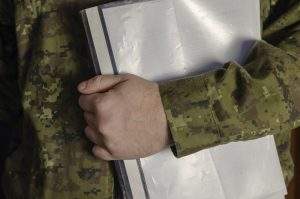As tens of thousands of Americans headed overseas to fight wars in Iraq and Afghanistan over the past decade, the federal government had a program in place to give those injured in service a boost when they return home.
The Veterans Benefit Act of 2003 carved out a special preference in government work for small businesses owned by service disabled veterans. Under the law, 3 percent of all government contracts are supposed go to small businesses such as construction companies, computer software firms and medical supply companies.
Despite noble intentions, the preference program has been the subject of several reports by government auditors concluding that its riddled with fraud and cheating by unscrupulous contractors. Some of the problems can be attributed to poor oversight regarding who gets contracts.
As early as 2009 the Government Accountability Office warned the program was vulnerable to fraud and abuse, largely because the government had virtually no fraud detection controls in place.
In 2011, the Inspector General for the Department of Veterans Affairs found that the VA had given nearly $50 million in contracts to firms that werent veteran-owned. That was from a review of 42 selected businesses, a fraction of the thousands of contracts awarded annually.
The report warned that if the agency did not get a better handle on the problem, fraud could balloon to $500 million in five years.
Since 2008 VA fraud investigations into the program have resulted in 44 indictments of individuals or their companies, some of them long-running and audacious. For example in August a non-veteran construction contractor in Nebraska pleaded guilty to major program fraud. Prosecutors said for three years he used a company owned by a service disbaled veteran as a front to get contracts destined for legitimate disabled vet companies.
Total take: $23.5 million in bogus contracts before the scheme was uncovered.
There are plenty of vets with substantial disabilities who deserve whatever set asides are meant for them, said Hardy Stone, a disabled vet who started VetLikeMe, a web-based publication devoted to covering the disabled veteran programs after the fraud revelations first surfaced in 2009. Just about anyone could say they were a disabled vet, and get away with it.
U-T Watchdog asked the Inspector Generals offices of both the VA and the Small Business Administration for examples of successful prosecutions of vet preference fraud in California since 2010. There werent any, both agencies responded.
HARD TO PROVE
Under the law the VA is required to verify that a business applying for the preference is owned and controlled by a disabled veteran. The VA has access to service records and can detemine whether a veteran was discharged with a service-related disability.
The veteran has to own at least 51 percent of the company, have full decision-making authority and run the company on both a strategic policy and day-to-day basis.
There are 7,147 businesses listed in the agencys VetBiz database, the official record for legitimate disabled veterans preferenced businesses. Of those, 516 are in California and 142 in San Diego County.
A 2012 GAO report highlighted five firms that received $190 million in contracts for disabled veterans between October 2009 and December 2011, even though there was evidence the firms were ineligible.
One common fraud is a rent-a-vet scheme, in which a company thats not eligible recruits a legitimate disabled veteran and offers money in exchange for use of the vets credentials.
Another scheme is known as a pass-through. A veteran-owned business wins a contract, and then the work and the money mostly flow to a second company that is too large to qualify as a small business or isnt owned and controlled by a vet.
Even with evidence of fraud, prosecutions are a low priority, said Scott Denniston, executive director of the national Veterans Small Business Coalition. A former head of small business programs for the VA, he said that it was difficult to get prosecutors to pursue cases.
It was always a struggle to get these issues up high enough to with (prosecutors) to get them to do anything, he said.
Complicating matters, Denniston said, is that government rules for the preference programs are confusing and vague and lend themselves to gray areas that make fraud difficult to distinguish from errors.
FAMILY BUSINESS
Over the past two years, several lawsuits have been filed by former employees of Stronghold Engineering, a large construction company located in Riverside. The three lawsuits each allege that another company, Kadena Pacific, operated from 2006 to 2010, fraudulently claiming service disabled veteran status.
The suits allege that Kadenas owner, 78-year-old disabled Air Force veteran Freddie Neff, didnt control the business or run its daily operations. His daughter and son-in-law, Beverley and Scott Bailey, are the owners of Stronghold.
For years, Kadenas business was located at the same address Stronghold used for a decade before moving to a new address. Kadena worked on several porjects in San Diego, including the $3.2 million expansion of the colambarium at Ft. Rosecrans National Cemetery in 2008-09.
Over the years Kadena was awarded about $43 million in contracts, according to government records. In 2010 another company filed a formal protest to the VA, alleging Kadena was a pass-through to Stronghold.
Also in 2010 the SBA determined that Kadena was too big to qualify as a small business, since its revenues exceeded $33 million per year. The company closed in 2012, and Neff has since started a new company in Riverside.
In an interview Neff said the allegations were bogus.
There is no truth in it, he said.
He said he worked at the business daily and had little contact with his daughters company. The allegations come from a former executive who Neff said was an officer in both Kadena and Stronghold a link that contributed to the SBA finding.
We had hardly any interaction between us, he said. Its just baloney.
Scott Bailey said the allegations are from a disgruntled former employee and said the Kadena was always run by his father-in-law. Both he and Neff said the new company, Cal American Construction Inc., is certified by the VA and has no affiliation with Stronghold.
Cal American has won several veterans contracts.
HONOR SYSTEM
The governments efforts to help service disabled veterans are coordinated through two separate programs.
One is run by the VA and pertains to all contracts that the agency hands out. Each year, the VA accounts for nearly 30 percent of all government contract awards given out in the service disabled vet preference, according to the GAO.
For all other government agencies, including the Department of Defense, the Small Business Administration is charged with administering veterans preferences.
The law does not require the SBA to verify whether a firm applying for a preference is eligible, and the agency requires no documentation from applicants. Instead, it relies on a self-certifying process. Basically that means a business simply says its owned and controlled by a service disabled veteran.
So even contracts that the Department of Defense gives out arent going to companies that have been verified as legitimate veteran-owned businesses.
That means without basic checks on firms eligibility claims, SBA cannot provide reasonable assurances that legitimate SDVOSB are receiving government contracts, the GAO concluded in a 2012 report.
The dual programs also have different rules for eligibility, said Steve Koprince, a lawyer and expert on small business contracting with the federal government who follows the service disabled program.
Some of the requirements for those two programs are similar, but not identical, he said.Its possible to qualify for one program, and not another.
A bill pending in Congress would strip the VA of the verification authority of businesses and transfer that to the SBA. Not everyone is convinced that is the right thing to do or that it would stem fraud any more effectively.
Theres been fraud in every small business program, Denniston said. You can only write so many rules. People who want to figure out a way around them because theyre bums, are going to find a way around it.





